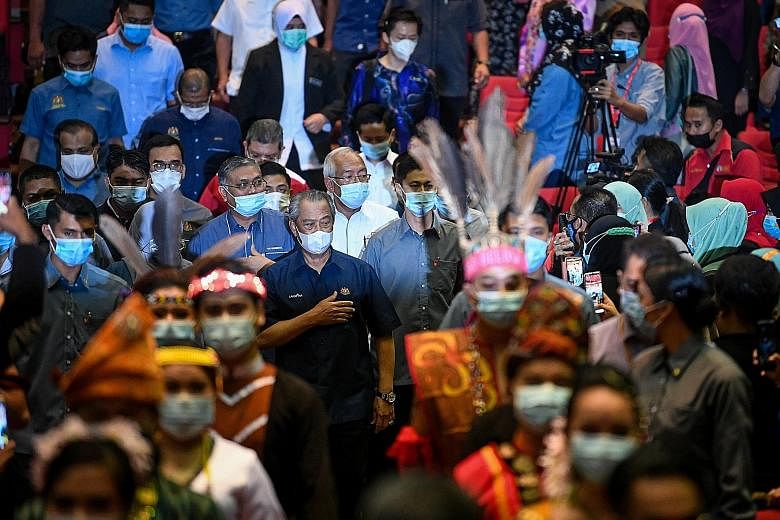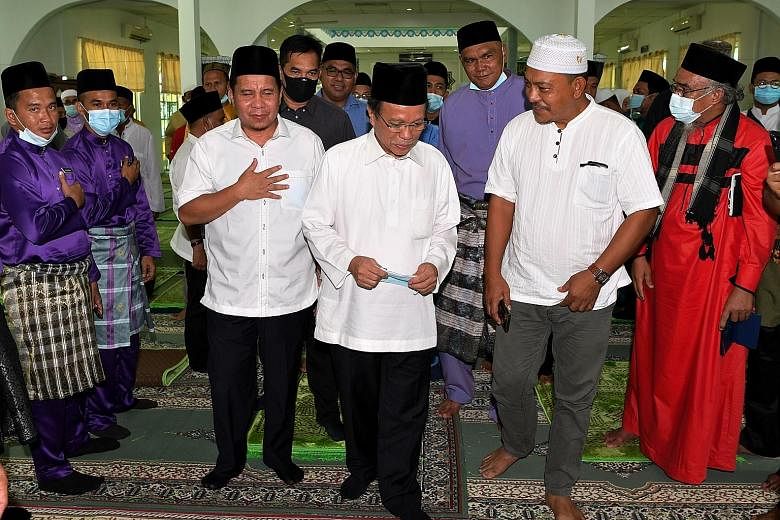Candidates for Sabah's 73 state seats will file their nominations today in what is a contest not just for Malaysia's easternmost state, but also for the legitimacy of two leading candidates to govern the country in the future.
Prime Minister Muhyiddin Yassin is secure as head of the seven-month-old Perikatan Nasional (PN) government at least until he calls for expected snap polls, where the opposition could be led by incumbent Sabah Chief Minister Shafie Apdal.
But whoever is on the losing side of the battle for Sabah will find his credibility in seeking a full term as prime minister severely dented.
"Parties want to know whether their PM candidate can actually deliver votes, so Sabah is a dry run," Singapore Institute of International Affairs senior fellow Oh Ei Sun told The Straits Times.
Tan Sri Muhyiddin, riding on a wave of approval over Kuala Lumpur's handling of the virus outbreak, has been forced into an early test of the cohesiveness of his fledgling ruling pact after Datuk Seri Shafie convinced the Sabah governor, a ceremonial head of state, to dissolve the legislature when defectors deprived his Parti Warisan Sabah-led coalition of a majority in July.
Mr Shafie has been nominated as a candidate for the premiership by most opposition parties except Parti Keadilan Rakyat (PKR), which insists its president Anwar Ibrahim must ascend to the highest office.
A deal for Datuk Seri Anwar to replace former prime minister Mahathir Mohamad was scuppered when Pakatan Harapan (PH) was toppled by defections in February.
Analysts believe that results of the Sabah election on Sept 26 will impact internal dynamics in both opposition and government pacts.
"A Warisan loss would embolden detractors in PH to argue that Shafie would not be able to deliver Malaysia if he can't even deliver his home state," said Dr Oh.
If Mr Muhyiddin's Parti Pribumi Bersatu Malaysia and PN fail to deliver in Sabah, he may lack leverage to secure enough seats for his party at the general election and may find himself unable to resist Umno's desire to wrest back the premiership.
Mr Muhyiddin has had to fight hard to retain his slim parliamentary majority - 113 out of 222 MPs - amid jostling for leverage by allies in the coalition.
Umno, the largest party in government, is refusing to join an officially registered PN, and wants to contest as Barisan Nasional (BN), the once dominant coalition it leads.
Bersatu and its allies will contest the Sabah vote using at least three different flags, and have yet to agree on who would be chief minister should they emerge victorious.
The political uncertainty clouding the Muhyiddin administration has pushed ruling parties to call for fresh polls expected by early next year, while the premier himself has also declared to his party that he wants to claim a strong personal mandate.
National opinion polls had the prime minister's approval at 69 per cent last month, while the Society Empowerment and Economic Development of Sabah (Seeds) think-tank found in its survey two weeks ago that nine of 10 people in the state were satisfied with his performance.
On the other hand, nearly 40 per cent of Sabahans pick Mr Shafie as the best chief minister candidate, more than the three likeliest choices from Umno and Bersatu received combined, the Seeds survey showed. But only 54 per cent approved of the Warisan state government, as compared with the 82 per cent for PN at federal level.
"Shafie has certain qualities - (he is) a good speaker, down to earth, so people like his personality. But when it comes to governing, people are not so happy," Seeds chairman Arnold Puyok told ST. "If PN talks about how they are going to fix Sabah's economy, they will stand a good chance."
A top Warisan leader told ST: "It is a proxy battle between Shafie and Muhyiddin. This may explain why Anwar decided to launch PKR's own election machinery last weekend instead of endorsing our president."
The so-called Warisan Plus campaign led by Mr Shafie was launched simultaneously and included the Democratic Action Party and Parti Amanah Negara - components of the Anwar-led PH coalition - as well as local party United Progressive Kinabalu Organisation.


